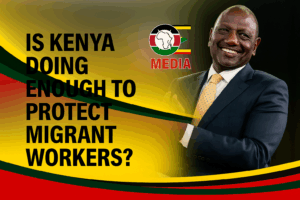
For years, thousands of Kenyan women have sought job opportunities in the Middle East, hoping that domestic work abroad would provide a path out of poverty. But beneath the promise of better pay lies a darker, deeply troubling system — one that has quietly transformed into a multi-billion-shilling labour pipeline built on exploitation, political interests, and weakened worker protections.
A recent investigative report has reignited national debate after uncovering how Kenya’s rapid labour-migration boom has been accompanied by rising cases of abuse, trafficking, and systemic neglect of vulnerable migrant workers.
A Lucrative Pipeline Built on Vulnerable Women
The Middle East domestic-work route — especially to Saudi Arabia — has become one of Kenya’s largest sources of remittances. But it is also a route filled with horror stories of violence, unpaid labour, sexual abuse, and deaths.
Instead of strengthening oversight, the investigation suggests that political actors and private agencies have tightened their grip on recruitment, turning the system into a powerful revenue engine.
What was once meant to offer economic relief has now become a conveyor belt where Kenya’s most vulnerable women are routinely exposed to:
-
Abusive employers
-
Hostile working environments
-
Lack of labour protections
-
High recruitment debts
-
Minimal government intervention
A System Weakened by Conflicts of Interest
One of the most alarming allegations is the deep involvement of politically connected individuals in the recruitment and staffing sector.
Investigators claim that:
-
Some recruitment agencies have direct political ties
-
Oversight mechanisms have been weakened
-
Certain insurance and welfare systems linked to migrant protection have been compromised
-
Accountability structures are either ineffective or intentionally diluted
These conflicts of interest may explain why, despite repeated tragedies, the system continues operating with little reform.
Saudi Arabia: The Epicentre of Abuse Reports
Saudi Arabia remains the top destination — and the most controversial.
Over the past several years, Kenyan families have repeatedly reported:
-
Workers being beaten or tortured
-
Women forced to work around the clock
-
Confiscation of passports
-
Sudden disappearances
-
Bodies returning home under suspicious circumstances
Despite this, recruitment continues to expand, raising questions about whether economic gains are being prioritised over human rights.
Is Kenya Doing Enough to Protect Migrant Workers?
The investigation challenges the government’s public commitment to migrant safety. Instead of a strong, independent system to safeguard workers, the report suggests that Kenya may have aligned itself more closely with private interests benefiting from the status quo.
Key concerns include:
-
Reduced enforcement of recruitment regulations
-
Agencies operating without adequate accountability
-
Slow response to abuse cases
-
A protective system that appears more symbolic than effective
What Needs to Change
Labour migration is not the problem — mismanagement is.
Experts argue that Kenya must urgently:
-
Reinforce recruitment agency regulation
-
Create an independent migrant-worker ombudsman
-
Strengthen bilateral labour agreements
-
Provide better pre-departure training and legal awareness
-
Ensure politically linked entities are removed from the welfare and insurance systems
-
Invest in safe reporting channels for workers abroad
Without these reforms, Kenya risks perpetuating a system where economic desperation is exploited for profit — and where migrant domestic workers continue to pay the highest price.
Conclusion
The migrant-worker crisis is not just a labour issue — it is a human rights issue, a governance issue, and increasingly, a political accountability issue.
As more revelations surface, pressure is mounting on the Kenyan government to confront the uncomfortable truths behind this multi-billion shilling industry — and to finally put the lives and dignity of migrant workers above political and financial interests.




